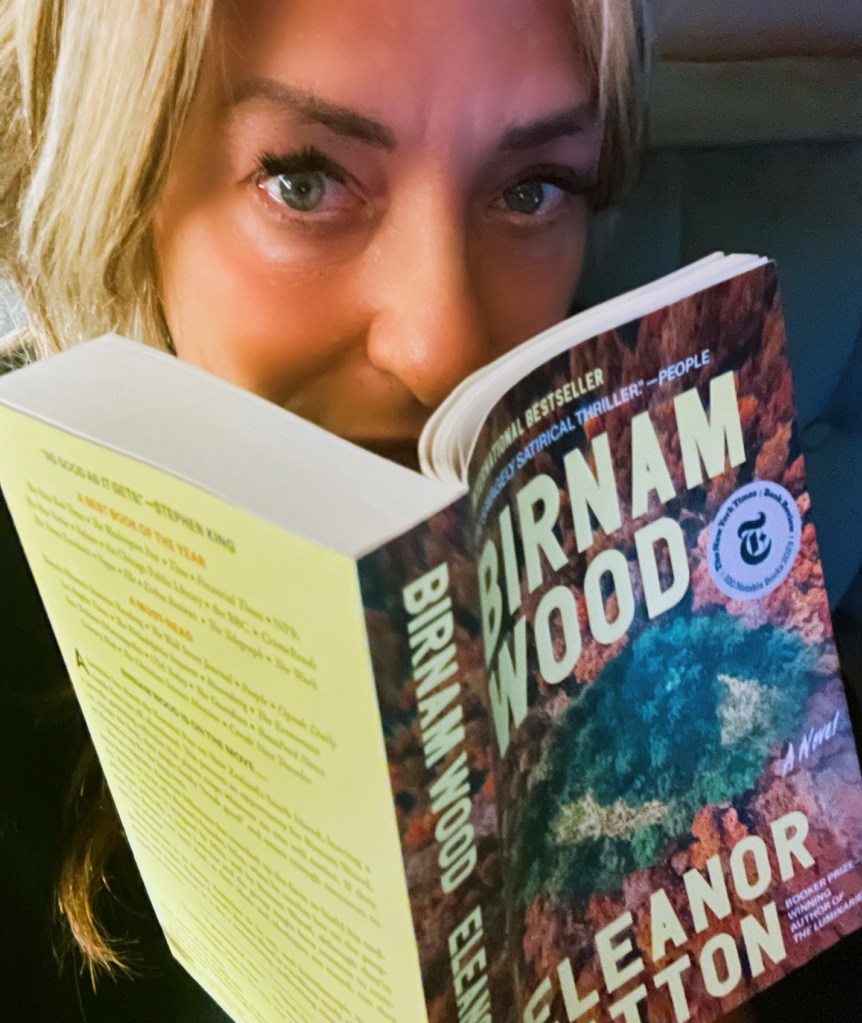It’s a gore fest but you gotta wait-medium-sized spoilerishness ahead
As I began reading Eleanor Catton’s Birnam Wood, I felt I was in an A.S. Byatt novel–Byatt builds tension by having her main characters do everyday things like water plants. Meaningfully. While their internal dialogue is frightening and metaphorically reverberating. Like a gong was ringing and stopped but still making our ear drums thrum.
We meet self-absorbed yet eco-obsessed Mira whom I kept picturing as the actress from Love and who played the insufferably awesome Mimi Rose Howard, the artist who snatched Adam away from Hannah briefly on “Girls.”

The ethereal and in no way a mean girl, Mimi Rose, played by Gillian Jacobs (r) tries to pretend she’s not yet noticed Hannah’s obnoxious “pick me” energy, done perfectly by Lena Dunham (l) on Girls. (HBO)
I digress. We then meet Shelley, who seems to have a homoerotic crush on Mira and is described as often mistaken “for a dogsbody, a beta fish, a bridesmaid, a ride-along.” To me she felt like the quintessential Virgo, along for the details and to take care of everything. As long as you realize and verbally gush about what a martyr she is for doing so, you can walk all over this brand of best friend forever. Did I mention I have self-diagnosed as a sociopath?
However, not as much of a sociopath as the big baddie in the book: Robert Lemoine. God, he’s funny, though. He reminds me of the Alexander Skaarsgard character in Succession. His ick factor through the roof, Lemoine sidles up to Mira as she’s trespassing on land he’s about to buy, telling her he’s keen to underwrite her guerrilla gardening collective. Mira and an ex hookup named Tony christened Birnam Wood after a scene in Shakespeare: “Macbeth shall never vanquished be until Great Birnam Wood to high Dunsinane Hill shall come against him.” Didn’t reverberate for me as a metaphor, but okay. There are some Macbeth references in the very beginning but I felt that thread was dropped about halfway through, and good riddance. Love Shakespeare (I used to call him, “Willie the Shake” during undergrad) and the blueprint for madcap tragedy the playwright gives us has inspired everyone from Brian dePalma for Scarface to well, almost every episode of Game of Thrones. I love the play but I think we’re meant to take the metaphor lightly, as in, Tony and Mira will try to vanquish evil with too few of an army and too burly a foe.

Tony, in particular, doesn’t have a chance. He’s my favorite character in this book, somehow callow and manipulative all at the same time. Ah, Tony. He really goes through it. I’m not going to spoil anything but he’s the beating heart of Birnam Wood for me, a journo wannabe philosopher whose mad solipsism reminds us more of Lear or young Hamlet than of Macbeth (or his Lady). Although acting a fool much of the time, Tony speaks for all of us when he says things like: “the utter shamelessness with which his natural inheritance, his future, had been either sold or laid to waste by his parents’ generation, trapping him in a perpetual adolescence that was further heightened by the infantilizing unreality of the internet as it encroached upon, and colonized, real life — ‘real life,’ Tony thought, with bitter air quotes.” Tony’s aim is to save the planet and get famous for doing it, to uncover all the undisguised greed and general assholery of late-stage capitalists and still somehow make shitloads of money from the expose without becoming a late stage capitalist himself.
Tony’s almost got the fame part locked down when shit really hits the fan. He uncovers something horrific the billionaire is doing, right before someone dosed on acid runs over another main character. Suffice it to say, as a millennial manifesto of just how fucked the world is, we almost (but not quite) shrug when one of the OK Boomers get squashed by a Vanno. The last 1/4 inch of this book is apeshit in all the right ways.
But. I’m kind of floored by the plot twists I didn’t see coming and the random couplings that pant in and out of this novel. I want to say that Eleanor Catton is a genius but that word has almost thoroughly lost its meaning. I mean, it’s applied to the most hideous of songsmiths imaginable. Let me just make a list of what she does flawlessly in this book:
- She plants seeds of characterization that only fully bloom when it’s inevitable. And then she surprises us with the inevitable strangeness of how people react and ac in real life.
- She will never drone on (even when she is explaining high-tech drones or mineral mining, her prose is crisp like a bite of an apple).
- When shit goes sideways, she has her characters react exactly like you’d want them to–but with some additional surprises that are both exciting and scary.
- The book’s dialogue is atrociously true to life in the best way in that these fucking people would say this stuff exactly the way they do and it’s cringey and perfect.
- The prose is gorgeous.
I’m not going to deconstruct the way she works her magic. You don’t dig up a seed to describe how it’s growing. Nor do you ever, ever trust a billionaire tech dude. What I would like to say is that Catton immerses us so thoroughly in the story it’s as if it’s not a story anymore but a true-crime podcast based on a news story–the kind you can’t get out of your head. The novel is both of this moment and speculatively futurististic.It feels like an inescapable prediction. I fucking loved it.
